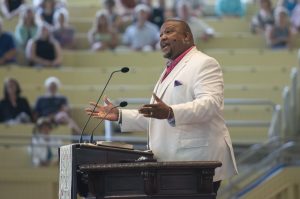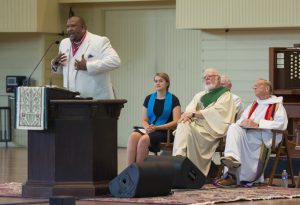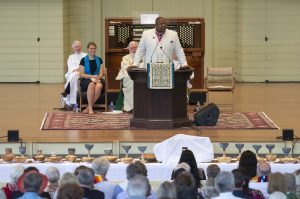
” What color is Jesus?” asked the Rev. David Anderson at the 10:45 a.m. Sunday Ecumenical Service of Worship and Sermon and Communion Service. His sermon title was “The Powerful Art of Inclusion,” and the Scripture readings were 1 Corinthians 12, selected verses, and Luke 6:37-38.
“A study group was reading a book titled What Color is Jesus?” Anderson said. “As they were musing, each member began to speak from their own perspective.”
One man said Jesus had to be Italian because he talked with his hands and drank wine with every meal. A California hippie said Jesus had to be a Californian because he had long hair, wore sandals and invented his own religion.
The Jewish member of the group said, ”He had to be Jewish because he knew the Hebrew Bible, left home at 33 and started his own business.”
A Latino member said that Jesus had to be Puerto Rican because he was bilingual and was named Jésus.
Finally, a black member of the group said that Jesus had to be black because he liked gospel, called everyone brother and couldn’t get a fair trial.
“My point,” Anderson said, “is that we want to see Jesus through the prism of our own experience, whether we are a 75-year-old white woman, a 19-year-old young black man, a 7-year-old Korean or a migrant family at the border.”
The good news is that Jesus can be seen in and through all of us.
“This is the art of inclusion,” he said. “God sent Jesus to include us in a relationship with him.”
Anderson’s theme for the week is gracism.

“Gracism is God’s answer to racism,” he said.
He defined racism as to speak, act or think against someone based solely on their color, class or culture.
“Grace is good, it is God’s unmerited favor,” Anderson said. “You cannot earn it, you don’t deserve it and you can’t repay it. I want you to go and be the biggest gracist, to extend positive favor regardless if it is earned, deserved or repaid.”
The “G” in gracism is for God.
“If you put God before any matter, God will give you a solution, show you that way through,” he said.
Anderson asked the congregation to imagine an Earth populated with gracists.
“If God extends that grace to me, what would it mean for us to extend it to others? What kind of earth would that be?’
In his book Gracism: The Art of Inclusion, Anderson lists “Seven Sayings of a Gracist.” These sayings come from 1 Corinthians 12.
“Paul was writing to a community where there were lots of differences in culture, race and class,” he said. “But there is only one Spirit, and Paul was asking them to find unity in their diversity, the unity that comes from God by whose grace we get to the feet of Jesus.”
Anderson told the congregation that “we can’t be gracists without help. Without the Holy Spirit, it would be hard to be in my skin.”
On his first day of work as an intern at Willow Creek Church, Anderson left home early because he was the only black person on the staff and he did not want to be late. He wanted to be early. On his way to the church he was stopped by police because “I fit the description of someone.”
He was the only one late to the first meeting. When they broke for lunch, he went out and again was stopped by police because “I fit the description of someone.” Again, he was late for the next meeting.
“In those first 24 hours as an intern at Willow Creek, I was not stopped once, not twice, not three times but four times,” he said. “Welcome to the neighborhood, Dave Anderson.”
If it was not for the Holy Spirit, “downloading grace and forgiveness to me, I would not be at Chautauqua today,” he added.
“There are many gracists here and I know many of you will be converted,” Anderson said. “The world will be better because of you, and I trust that God is in you.”
Anderson went through each of the seven sayings and asked the congregation repeat them after him. He encouraged people to say them to the person they were sitting with. The sayings are: I will lift you up, I will cover you, I will share with you, I will honor you, I will stand with you, I will consider you and I will celebrate with you.
“When we get these down, when counties, cities, universities, congregations, countries get these down, we will see bridges built,” Anderson said.
The true power of inclusion is when you can repeat these sayings to people you don’t know or don’t like.

“This is why we need the Holy Spirit,” he said.
“The question is not, ‘Does Jesus look like you or me?” Anderson said, “but do we look like Jesus? Then there will be 7 billion ways that God can make himself known.”
Anderson closed with a story about two brothers who live on a family farm. They had argued many years before and used the creek that ran through the property as a dividing line.
One day the older brother hired a day laborer to build a wall at the water’s edge.
“You build the wall, and when I get back from town and see it, I will pay you,” the brother said.
When he got back from town, he saw a bridge, not a wall. The laborer was in the middle of the bridge, and the man walked out and screamed at him for not building the wall.
As the older brother was screaming, the younger brother walked out on the bridge and said, “Thank you for building this bridge. I am sick of being divided from you.” The older brother felt his own contrition and said, “It is all water under the bridge.”
As the brothers hugged and talked, the older brother turned to the laborer and said “You have done well; I am going to double your pay. Please stay around for a few days.”
The laborer said, “I can’t. I have more bridges to build.”
“May you be a bridge-building gracist,” Anderson said.
The Rt. Rev. V. Gene Robinson, vice president of religion and senior pastor, presided. Anna Grace Glaize, the Christian coordinator for the Abrahamic Program for Young Adults and a student at Yale Divinity School, read from 1 Corinthians 12. Deacon Ray Defendorf, host with his wife Pat at the Catholic House for the first half of the season, read from Luke. Jared Jacobsen, organist and coordinator of worship and sacred music, directed the Chautauqua Choir. The Choir sang “Ubi Caritas” by Maurice Duruflé for the anthem. Peter Steinmetz served as cantor for the responsorial Psalm, “We Are God’s People” by David Haas. The offertory anthem was “Come to Me,” by Craig Courtney, sung by the Choir. The music during communion was “Le Banquet Céleste,” by Olivier Messiaen and “Communion Anthem” by David E. Kellermeyer, based on “A Study Song for Chautauqua,” by Mary Artemisia Lathbury. The organ postlude was “Toccata in B” from Dix Pièces, IV by Eugène Gigout. The Mr. and Mrs. William Uhler Follansbee Memorial Chaplaincy and the Jackson-Carnahan Memorial Chaplaincy provide support for this week’s services.
Robinson concelebrated the communion with a number of clergy serving at the denominational houses. The communion bread was baked by Jean Badger, Gena Bedrosian, Doreen Gould, Mary Ellen Kimble, Alison Marthinsen, Nancy Nelson and Anne Palomaki. Many of the bread plates were made by Tom Osbourn and Bob Boehm, using trees from Chautauqua. The communion grape juice was donated by the Growers Co-Operative Grape Juice Company of Westfield, New York. The matched communion chalices were created in 2005 at the Ceramics Studio at the School of Art, under the direction of Jeff Greenham. In addition, Bishop John Heyl Vincent’s chalice and a historic chalice made in Erie, Pennsylvania, before the founding of the Institution, were used. Additional chalices came from the Baptist House, Chautauqua Catholic Community, Disciples of Christ, Evangelical Lutheran Church of America, The Presbyteiran Association of Chautauqua, The United Methodist Church, United Church of Christ and the Unitarian Universalist fellowship. The gold silk stoles and matching altar paraments were from Jacobsen’s collection for First Lutheran Church in San Diego, California. There was a parade of banners from the denominational houses during the opening hymn, and the clergy and their assistants walked behind them. The coordinators of the communion are Ruth Becker, logistics, and Beth Gunnell, clergy and assistants.




